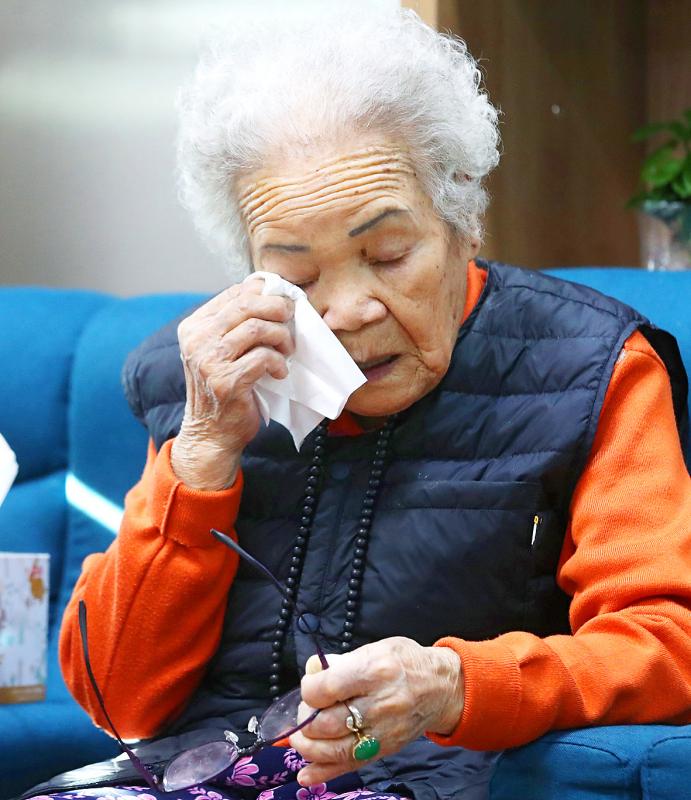A South Korean court yesterday ordered the Japanese government to pay compensation to 12 World War II “comfort women” or their families, in an unprecedented ruling that prompted an immediate denunciation by Tokyo.
The Seoul Central District Court ruled that Japan should pay the victims 100 million won (US$91,446) each.
It is the first civilian legal case in South Korea against Tokyo by wartime victims of Japanese troops, who were euphemistically labeled “comfort women.”

Photo: EPA-EFE
The ruling comes despite a 1965 treaty between Seoul and Tokyo, which declared that claims between them and their nationals had been settled.
Imperial Japan was responsible for the comfort women system, the court said in its verdict.
“The plaintiffs, who were in their late teens or early 20s, were subjected to repeated sexual exploitation,” it said. “It amounted to an illegal act against humanity and the defendant has an obligation to compensate the victims for their mental suffering.”
Ties between the neighbors are strained by Japan’s colonial rule over the Korean Peninsula — which is still bitterly resented — and have plunged to their worst in years under South Korean President Moon Jae-in.
Tokyo denounced the ruling as a contravention of international law and summoned the South Korean ambassador to protest, demanding that Seoul intervene.
“It is extremely regrettable that the Seoul Central District Court denied the principle of sovereign immunity,” the Japanese Ministry of Foreign Affairs said in a statement. “This is unacceptable to the Japanese government.”
The ruling came in a legal process that began eight years ago and only five of the original plaintiffs are still alive, the others replaced by family members.
“I am deeply moved by today’s ruling,” said Kim Kang-won, the women’s lawyer. “It is the first such verdict for victims who suffered at the hands of Japanese troops.”
Speaking to reporters after the verdict, he insisted that at the time of the 1965 treaty, “the issue of comfort women was not discussed at all.”
Nearly half of China’s major cities are suffering “moderate to severe” levels of subsidence, putting millions of people at risk of flooding, especially as sea levels rise, according to a study of nationwide satellite data released yesterday. The authors of the paper, published by the journal Science, found that 45 percent of China’s urban land was sinking faster than 3mm per year, with 16 percent at more than 10mm per year, driven not only by declining water tables, but also the sheer weight of the built environment. With China’s urban population already in excess of 900 million people, “even a small portion

UNSETTLING IMAGES: The scene took place in front of TV crews covering the Trump trial, with a CNN anchor calling it an ‘emotional and unbelievably disturbing moment’ A man who doused himself in an accelerant and set himself on fire outside the courthouse where former US president Donald Trump is on trial has died, police said yesterday. The New York City Police Department (NYPD) said the man was declared dead by staff at an area hospital. The man was in Collect Pond Park at about 1:30pm on Friday when he took out pamphlets espousing conspiracy theories, tossed them around, then doused himself in an accelerant and set himself on fire, officials and witnesses said. A large number of police officers were nearby when it happened. Some officers and bystanders rushed

HYPOCRISY? The Chinese Ministry of Foreign Affairs yesterday asked whether Biden was talking about China or the US when he used the word ‘xenophobic’ US President Joe Biden on Wednesday called for a hike in steel tariffs on China, accusing Beijing of cheating as he spoke at a campaign event in Pennsylvania. Biden accused China of xenophobia, too, in a speech to union members in Pittsburgh. “They’re not competing, they’re cheating. They’re cheating and we’ve seen the damage here in America,” Biden said. Chinese steel companies “don’t need to worry about making a profit because the Chinese government is subsidizing them so heavily,” he said. Biden said he had called for the US Trade Representative to triple the tariff rates for Chinese steel and aluminum if Beijing was

Beijing is continuing to commit genocide and crimes against humanity against Uyghurs and other Muslim minorities in its western Xinjiang province, U.S. Secretary of State Antony Blinken said in a report published on Monday, ahead of his planned visit to China this week. The State Department’s annual human rights report, which documents abuses recorded all over the world during the previous calendar year, repeated language from previous years on the treatment of Muslims in Xinjiang, but the publication raises the issue ahead of delicate talks, including on the war in Ukraine and global trade, between the top U.S. diplomat and Chinese